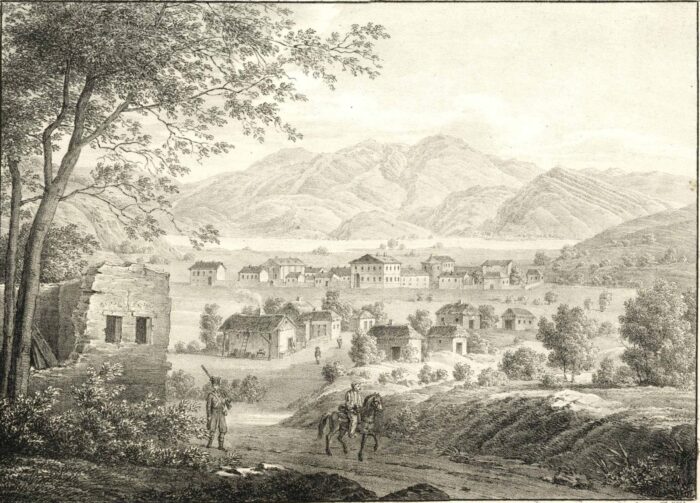DaQuaS
Research ProgramsEntangled Histories of the Danubian Quarantine System (1774–1914)
Entangled Histories of the Danubian Quarantine System (1774–1914)

Exploratory Research PN-III-P4-PCE-2021-1374
Timeframe:
June 2022 – December 2024
Team:
Project Leader:
Constantin ARDELEANU, PhD, Professor, The “Lower Danube” University of Galați / Institute for South-East European History, Bucharest
Experienced Researcher:
Silvia MARTON, PhD, Associate Professor, Faculty of Political Science, University of Bucharest
Lidia TRĂUȘAN-MATU, PhD, Lecturer, “Carol Davila” University of Medicine and Pharmacy / NEC, Bucharest (since October 2023)
Postdoctoral Researchers:
Andrei EMILCIUC, PhD, Researcher, The Institute of History, Chișinău
Andrei-Dan SORESCU, PhD, Researcher
Cosmin KOSZOR-CODREA, PhD, Researcher / NEC, Bucharest (since October 2023)

Lazaretto of Orșova, 1820s
This project aims to investigate – from an entangled and global histories perspective and in connection with recent developments in the transdisciplinary field of quarantine studies – the various functions of the quarantine system established in the eighteenth century and institutionalized after 1829 along the Lower Danube. A special focus will fall on the period stretching between 1829 and 1853, the climax of the Danubian preventive system, but it will also document quarantine arrangements made, in the second half of the nineteenth and in early twentieth centuries, by an international organization, the European Commission of the Danube, and by riparian states (Serbia, Bulgaria, and Romania).
The project will bring empirical and theoretical insight to the burgeoning field of quarantine studies, turned mainstream in the context of the current COVID-19 pandemic. Empirically, it will showcase the Danubian quarantine system as a hybrid version of the Russian, Austrian and Mediterranean models and will reveal how transnational sanitary cooperation looks like from the vista of small states. Lazarettos will be turned into paradigmatic hubs for the transfer of knowledge, technology and human resources in peripheral societies. Theoretically, the project aims to devise a model for how sanitary crises fuel modernization, based on a polynomial function that considers geopolitical, political, economic, societal, and sanitary factors.
- Concurs pentru un post de cercetător științific și un post de cercetător postdoctoral în cadrul proiectului „Entangled Histories of the Danubian Quarantine System (1774–1914)” (DaQuaS)
Pre-selection results
Pre-selection interview results
Final results
Workshop:
Carantine, epidemii, medici și sănătate publică în Principatele Dunărene/ România (1774-1914)
4-5 May 2023, at New Europe College